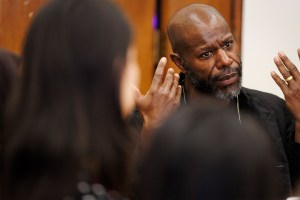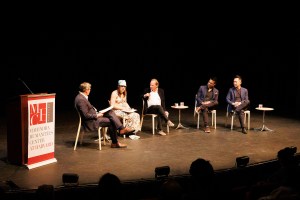‘The diverse ways history can be written’
Native Ukrainian historian, historiographer Plokhii flourishes in West
Relocating to a foreign city for a new job can be stressful in the most congenial circumstances. Trying to depart your home country in the middle of a Communist coup? As Serhii Plokhii, Hrushevs’kyi Professor of Ukrainian History in the Faculty of Arts and Sciences, can tell you — that’s downright complicated.
In August 1991, Plokhii planned to leave his native Ukraine for a post as a visiting professor at the University of Alberta. Though the Soviet era was nearly over, all international travelers still had to go through Moscow before leaving the country. Plokhii arrived one day before his flight to find the city in a state of emergency as a group of hard-line Communist party leaders attempted to wrest power from President Mikhail Gorbachev.
“As our train pulled into Moscow they announced there had been a coup. … I ended up wandering the streets of the city, wondering if I would be allowed to leave,” says Plokhii.
His plane departed on time, but even in the air Plokhii was unsure of his fate.
“I didn’t know if they would let us land,” he says. “I had started to think about other options, because if the coup was a crackdown on everything good about perestroika, I had no idea what would happen to my career.”
Thankfully for Plokhii (and the field of Ukrainian studies), the plane arrived safely in Canada. Back in the Soviet Union, the coup ended almost as quickly as it had begun.
Now, reflecting on the incident, Plokhii considers it fodder for an amusing travel tale.
“Before leaving Moscow I sent a telegram to my contacts in Canada with the details of my flight information, but I didn’t say that I personally would be arriving,” he recounts. Plokhii’s eyes twinkle and he laughs, pleased to find humor in what must have been one of the most trying experiences of his life.
Plokhii’s attitude speaks to a lifetime of resilience, of finding ways to pursue his intellectual goals despite a repressive political climate. As an undergraduate at Dnipropetrovsk University in southern Ukraine, Plokhii chose a major that would allow him a degree of freedom from Communist influences.
“When I arrived as a first-year, the head of the history department gave a lecture in which the leitmotif was ‘All students will be soldiers in the ideological struggle with the West,’” Plokhii says. “In that atmosphere, if you wanted to be independent, you had to choose an area of studies where the party politics penetrated less.”
Plokhii found that by focusing on religion and culture in early modern history he could exercise intellectual independence.
“Others chose ‘the history of the Communist party’ as their focus, but I found that you had more freedom as a scholar if you went further back in history,” says Plokhii. “The further you go, the less Soviet Marxism is applicable.”
In 1980, Plokhii received his B.A. in history and social sciences, and began postgraduate work on the study of historical methods. While many of his classmates became “communicators of Party politics, designed to implement and enforce Communism,” Plokhii immersed himself in the 17th century.
“There, I could be shielded from direct intervention,” he says.
Plokhii found more freedom in 1985, when Gorbachev and Ronald Reagan signed a scholarly exchange agreement to send young intellectuals to Soviet and American universities. Plokhii was invited to study at Columbia University, an experience that would have a lasting impact on his career.
“It was my first time abroad, anywhere,” says Plokhii. “Having unrestricted access to the library and seeing the open stacks really left an imprint on me. We didn’t have that kind of access in the Soviet Union, so the ability to work long hours was wonderful.”
Access and long library hours were not the only things impressive about Columbia. In the classroom, Plokhii discovered an entirely new approach to history.
“When I attended my first history lecture, I was shocked to discover that the professor taught his course without an emphasis on political figures, or specific dates,” Plokhii says. “It was eye-opening and fabulous to see the diverse ways in which history can be written.”
Plokhii took that message to heart, and he has continued to explore historical methodology throughout his career. After Columbia, Plokhii returned home to finish his postgraduate degree. He received a Ph.D. in history from Kiev University in 1990, and returned to teach at Dnipropetrovsk University before departing for Canada on the uneasy plane ride. While at the University of Alberta, his interests shifted from religion in the 17th century to nationality in the 21st.
“They wanted me to teach about the hard-liners in the Kremlin,” Plokhii says, “but I ended up focusing on the issue of nationality in Ukraine.”
Plokhii’s fascination with the culture and history of Ukraine eventually led him to accept a full-time position at the University of Alberta’s Peter Jacyk Centre for Ukrainian Historical Research. There, he served as a scholarly consultant on an edited version of the 10-volume “History of Ukraine,” written by the 19th century national historian Mykhailo Hrushevs’kyi. Plokhii became an associate director of the center in 1996, and was promoted to full professor in the department of history and classics in 2005. He also served as a visiting professor at Harvard, first in spring 2003 and again in fall 2005.
While at the Peter Jacyk Centre, Plokhii published his first major work, “The Cossacks and Religion in Early Modern Ukraine” (Oxford University Press, 2001). The text offers a comprehensive history of 17th century Ukrainian culture through the lens of Cossack ideology. He followed that study with “Unmaking Imperial Russia: Mykhailo Hrushevs’kyi and the Writing of Ukrainian History” (University of Toronto Press), published in 2006. In his study of Hrushevs’kyi, whom Plokhii calls the “greatest historian” of Ukraine, Plokhii identifies the ways in which Hrushevs’kyi constructed an “independent” national narrative for Ukraine and defied the imperial Russian approach to history.
The “greatest historian” continues to be an important figure for Plokhii — especially at Harvard, where Plokhii’s new position in the history department is named after Hrushevs’kyi. Plokhii was appointed Hrushevs’kyi professor of Ukrainian history in the Faculty of Arts and Sciences on July 1, 2007.
“I love the symbolism of the title,” says Plokhii. “It makes me feel as though my work has come full circle.” Plokhii keeps a small portrait of Hrushevs’kyi on the wall near his desk, a reminder of his early scholarship and the complicated road to Harvard.
Although he pays daily homage to his past, Plokhii is anything but mired in it. His next book, “Ukraine and Russia: Representations of the Past,” will be published in March 2008 by the University of Toronto Press. The text is a collection of essays about the two nations’ contest for history, from their early entanglement in the 18th century through the post-Soviet era.
“I am interested in how a nation struggles to overcome the limitations on historiography that are imposed by political paradigms,” Plokhii says.
In the meantime, he has already begun work on a book about the history of the 1945 Yalta conference, which he intends to explore from a cultural perspective. When not researching and writing, Plokhii is busy teaching a course on Eastern Europe in the early modern era and a seminar on Ukrainian and Russian identities. He is also active in the American Council of Learned Societies humanities program for Russia/Ukraine, a project that encourages young humanists to stay in academia.




